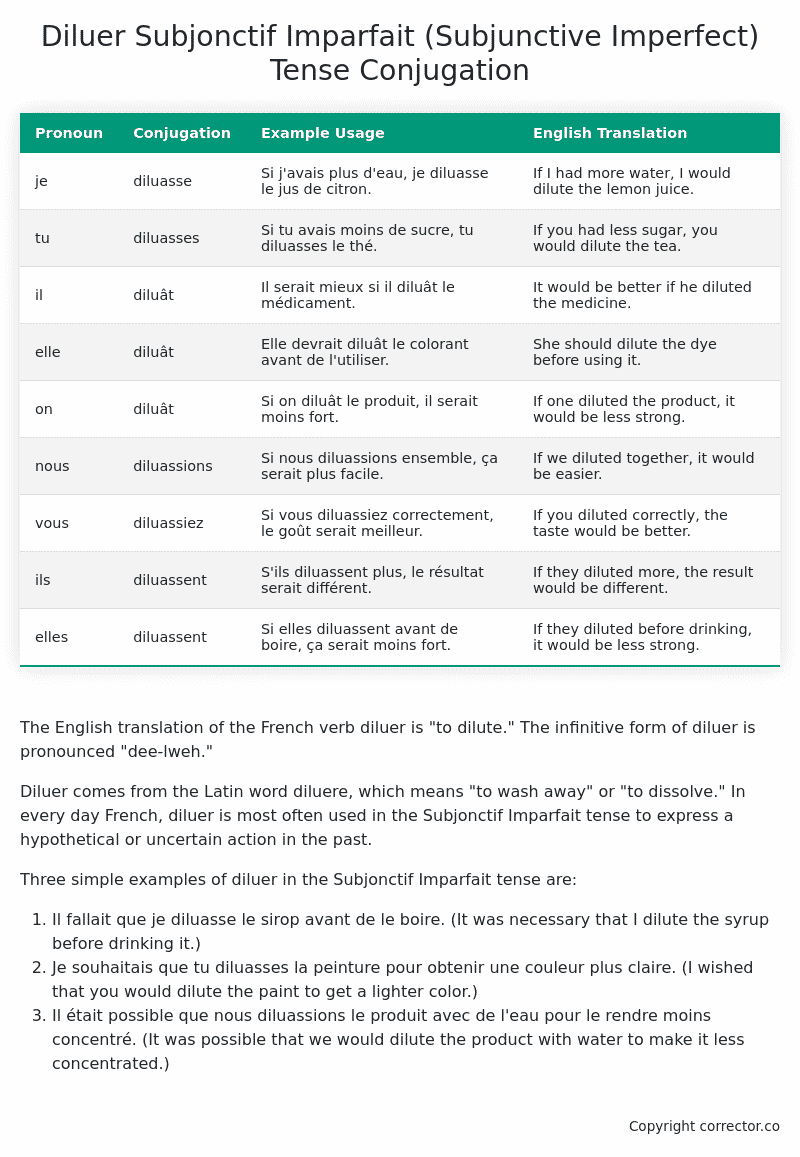Subjonctif Imparfait (Subjunctive Imperfect) Tense Conjugation of the French Verb diluer
Introduction to the verb diluer
The English translation of the French verb diluer is “to dilute.” The infinitive form of diluer is pronounced “dee-lweh.”
Diluer comes from the Latin word diluere, which means “to wash away” or “to dissolve.” In every day French, diluer is most often used in the Subjonctif Imparfait tense to express a hypothetical or uncertain action in the past.
Three simple examples of diluer in the Subjonctif Imparfait tense are:
- Il fallait que je diluasse le sirop avant de le boire. (It was necessary that I dilute the syrup before drinking it.)
- Je souhaitais que tu diluasses la peinture pour obtenir une couleur plus claire. (I wished that you would dilute the paint to get a lighter color.)
- Il était possible que nous diluassions le produit avec de l’eau pour le rendre moins concentré. (It was possible that we would dilute the product with water to make it less concentrated.)
Table of the Subjonctif Imparfait (Subjunctive Imperfect) Tense Conjugation of diluer
| Pronoun | Conjugation | Example Usage | English Translation |
|---|---|---|---|
| je | diluasse | Si j’avais plus d’eau, je diluasse le jus de citron. | If I had more water, I would dilute the lemon juice. |
| tu | diluasses | Si tu avais moins de sucre, tu diluasses le thé. | If you had less sugar, you would dilute the tea. |
| il | diluât | Il serait mieux si il diluât le médicament. | It would be better if he diluted the medicine. |
| elle | diluât | Elle devrait diluât le colorant avant de l’utiliser. | She should dilute the dye before using it. |
| on | diluât | Si on diluât le produit, il serait moins fort. | If one diluted the product, it would be less strong. |
| nous | diluassions | Si nous diluassions ensemble, ça serait plus facile. | If we diluted together, it would be easier. |
| vous | diluassiez | Si vous diluassiez correctement, le goût serait meilleur. | If you diluted correctly, the taste would be better. |
| ils | diluassent | S’ils diluassent plus, le résultat serait différent. | If they diluted more, the result would be different. |
| elles | diluassent | Si elles diluassent avant de boire, ça serait moins fort. | If they diluted before drinking, it would be less strong. |
Other Conjugations for Diluer.
Le Present (Present Tense) Conjugation of the French Verb diluer
Imparfait (Imperfect) Tense Conjugation of the French Verb diluer
Passé Simple (Simple Past) Tense Conjugation of the French Verb diluer
Passé Composé (Present Perfect) Tense Conjugation of the French Verb diluer
Futur Simple (Simple Future) Tense Conjugation of the French Verb diluer
Futur Proche (Near Future) Tense Conjugation of the French Verb diluer
Plus-que-parfait (Pluperfect) Tense Conjugation of the French Verb diluer
Passé Antérieur (Past Anterior) Tense Conjugation of the French Verb diluer
Futur Antérieur (Future Anterior) Tense Conjugation of the French Verb diluer
Subjonctif Présent (Subjunctive Present) Tense Conjugation of the French Verb diluer
Subjonctif Passé (Subjunctive Past) Tense Conjugation of the French Verb diluer
Subjonctif Imparfait (Subjunctive Imperfect) Tense Conjugation of the French Verb diluer (this article)
Subjonctif Plus-que-parfait (Subjunctive Pluperfect) Tense Conjugation of the French Verb diluer
Conditionnel Présent (Conditional Present) Tense Conjugation of the French Verb diluer
Conditionnel Passé (Conditional Past) Tense Conjugation of the French Verb diluer
L’impératif Présent (Imperative Present) Tense Conjugation of the French Verb diluer
L’infinitif Présent (Infinitive Present) Tense Conjugation of the French Verb diluer
Struggling with French verbs or the language in general? Why not use our free French Grammar Checker – no registration required!
Get a FREE Download Study Sheet of this Conjugation 🔥
Simply right click the image below, click “save image” and get your free reference for the diluer Subjonctif Imparfait tense conjugation!

Diluer – About the French Subjonctif Imparfait (Subjunctive Imperfect) Tense
Formation
Common Everyday Usage Patterns
Interactions with Other Tenses
Subjonctif Présent
Indicatif Passé Composé
Conditional
Conditional Perfect
Summary
I hope you enjoyed this article on the verb diluer. Still in a learning mood? Check out another TOTALLY random French verb conjugation!


